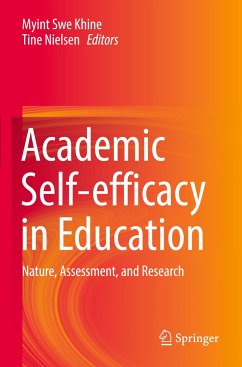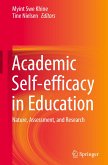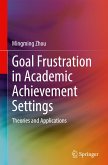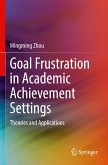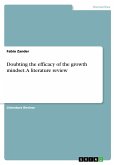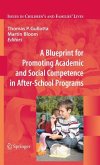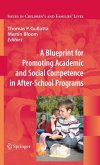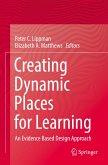Academic Self-efficacy in Education
Nature, Assessment, and Research
Herausgegeben:Khine, Myint Swe; Nielsen, Tine
Academic Self-efficacy in Education
Nature, Assessment, and Research
Herausgegeben:Khine, Myint Swe; Nielsen, Tine
- Broschiertes Buch
- Merkliste
- Auf die Merkliste
- Bewerten Bewerten
- Teilen
- Produkt teilen
- Produkterinnerung
- Produkterinnerung
This book documents systematic, prodigious and multidisciplinary research in the nature and role of academic self-efficacy, and identifies areas for future research directions within the three sections of the book: 'Assessment and Measurement of Academic Self-efficacy', 'Empirical Studies on What Shapes Academic Self-efficacy', and 'Empirical Studies on Influence of Academic Self-efficacy'.
The book presents works by educators and researchers in the field from various parts of the world, highlighting advances, creative and unique approaches, and innovative methods. It examines discussions…mehr
Andere Kunden interessierten sich auch für
![Academic Self-efficacy in Education Academic Self-efficacy in Education]() Academic Self-efficacy in Education129,99 €
Academic Self-efficacy in Education129,99 €![Goal Frustration in Academic Achievement Settings Goal Frustration in Academic Achievement Settings]() Mingming ZhouGoal Frustration in Academic Achievement Settings105,99 €
Mingming ZhouGoal Frustration in Academic Achievement Settings105,99 €![Goal Frustration in Academic Achievement Settings Goal Frustration in Academic Achievement Settings]() Mingming ZhouGoal Frustration in Academic Achievement Settings105,99 €
Mingming ZhouGoal Frustration in Academic Achievement Settings105,99 €![Doubting the efficacy of the growth mindset. A literature review Doubting the efficacy of the growth mindset. A literature review]() Fabio ZanderDoubting the efficacy of the growth mindset. A literature review14,99 €
Fabio ZanderDoubting the efficacy of the growth mindset. A literature review14,99 €![A Blueprint for Promoting Academic and Social Competence in After-School Programs A Blueprint for Promoting Academic and Social Competence in After-School Programs]() A Blueprint for Promoting Academic and Social Competence in After-School Programs41,99 €
A Blueprint for Promoting Academic and Social Competence in After-School Programs41,99 €![A Blueprint for Promoting Academic and Social Competence in After-School Programs A Blueprint for Promoting Academic and Social Competence in After-School Programs]() A Blueprint for Promoting Academic and Social Competence in After-School Programs41,99 €
A Blueprint for Promoting Academic and Social Competence in After-School Programs41,99 €![Creating Dynamic Places for Learning Creating Dynamic Places for Learning]() Creating Dynamic Places for Learning113,99 €
Creating Dynamic Places for Learning113,99 €-
-
-
This book documents systematic, prodigious and multidisciplinary research in the nature and role of academic self-efficacy, and identifies areas for future research directions within the three sections of the book: 'Assessment and Measurement of Academic Self-efficacy', 'Empirical Studies on What Shapes Academic Self-efficacy', and 'Empirical Studies on Influence of Academic Self-efficacy'.
The book presents works by educators and researchers in the field from various parts of the world, highlighting advances, creative and unique approaches, and innovative methods. It examines discussions around the theoretical and practical aspects of academic self-efficacy in culturally and linguistically-diverse educational contexts. This book also showcases work based on classical and modern test theory methods, mediation and moderation analysis, multi-level modelling approaches, and qualitative analyses.
The book presents works by educators and researchers in the field from various parts of the world, highlighting advances, creative and unique approaches, and innovative methods. It examines discussions around the theoretical and practical aspects of academic self-efficacy in culturally and linguistically-diverse educational contexts. This book also showcases work based on classical and modern test theory methods, mediation and moderation analysis, multi-level modelling approaches, and qualitative analyses.
Produktdetails
- Produktdetails
- Verlag: Springer / Springer Nature Singapore / Springer, Berlin
- Artikelnr. des Verlages: 978-981-16-8242-1
- 1st edition 2022
- Seitenzahl: 272
- Erscheinungstermin: 9. März 2023
- Englisch
- Abmessung: 235mm x 155mm x 15mm
- Gewicht: 417g
- ISBN-13: 9789811682421
- ISBN-10: 9811682429
- Artikelnr.: 67486955
- Herstellerkennzeichnung Die Herstellerinformationen sind derzeit nicht verfügbar.
- Verlag: Springer / Springer Nature Singapore / Springer, Berlin
- Artikelnr. des Verlages: 978-981-16-8242-1
- 1st edition 2022
- Seitenzahl: 272
- Erscheinungstermin: 9. März 2023
- Englisch
- Abmessung: 235mm x 155mm x 15mm
- Gewicht: 417g
- ISBN-13: 9789811682421
- ISBN-10: 9811682429
- Artikelnr.: 67486955
- Herstellerkennzeichnung Die Herstellerinformationen sind derzeit nicht verfügbar.
Dr Myint Swe Khine is Adjunct Professor in the School of Education at Curtin University, Australia. He holds Master's degrees from the University of Southern California, Los Angeles, USA and University of Surrey, Guildford, UK, and Doctor of Education from Curtin University, Australia. He has also worked at the Learning Science and Technology Academic Group at Nanyang Technological University, Singapore. He has published widely in established journals and edited several books published by academic publishers. Dr Tine Nielsen is Associate Professor at the Department of Applied Research in Education and Social Sciences at the UCL University College, Odense, Denmark. She holds a Bachelor's and Master's degree in Psychology from the University of Copenhagen, and a PhD in Educational Psychology and Psychometrics from The Danish University of Education. Her research is mainly in the cross-field of higher education psychology, health-related psychology, and psychometrics. She haspreviously been Associate Professor at the University of Copenhagen, Senior Advisor on Education at Copenhagen Business School and Head of Studies at the Department of Psychology at the University of Southern Denmark. She is also Subject Editor (higher education and psychometrics) for the Scandinavian Journal of Educational Research.
Part 1: Introduction.- Chapter 1. The Influence of Academic Self-efficacy Belief on Students' Achievement.- Part 2: Assessment and Measurement of Academic Self-Efficacy.- Chapter 2. Measuring Academic Self-Efficacy in Real-Time.- Chapter 3. Nurturing Learner Self-Efficacy Beliefs in STEM through Citizen Science: Theory, Assessment, and Applications.- Chapter 4. Assessment of Academic Self efficacy: Validity and Pragmatic uses of a Grid -Type Instrument .- Chapter 5. Psychometric Properties of the Spanish Translation of the Specific Academic Learning Self-Efficacy and the Specific Academic Exam Self-Efficacy Scales in a Higher Education Context.- Part 3: Empirical Studies on What Shape Academic Self-efficacy.- Chapter 6. Mathematics Self Efficacy: the dimensionality of the construct in the UK secondary and post-compulsory education population.- Chapter 7. What Shapes Academic Self-Efficacy?.- Chapter 8. Academic Self-Efficacy in a Globalized Era: Impacts of Culture and Cross-Culture.- Chapter 9. Children's self-efficacy in reading - specificity and longitudinal relations.- Chapter 10. Can Adaptive Learning Resources Boost Student Confidence? The Role of Adaptive Learning Resources in Shaping Self-Efficacy.- Chapter 10. Can Adaptive Learning Resources Boost Student Confidence? The Role of Adaptive Learning Resources in Shaping Self-Efficacy.- Chapter 11. Self-Efficacy in the Classroom: the Roles of Motivation, Positivity and Resilience ._ Chapter 11. Self-Efficacy in the Classroom: the Roles of Motivation, Positivity and Resilience .- Chapter 12. Promoting Online Student Persistence: Strategies to Promote Online Self-Efficacy ._ Part 4: Empirical Studies on the Influence of Academic Self-efficacy.- Chapter 13. Life satisfaction and engagement among university students: A moderated mediation model of academic self-efficacy and life orientation ._ Chapter 14. Relationship between Learning Environment and Academic Achievement: Mediating Role of Academic Self-efficacy ._ Chapter 15. The impact of academic self-efficacy on academic motivation: the mediating and moderating role of future orientation among Italian undergraduate students ._ Chapter 16. Academic Self-efficacy and its Influence on Teachers' Postgraduate Study Experiences: Voices from the Field.- Part 5: Concludion.- Chapter 17. Academic Self-efficacy in Educational Contexts: Current Research and Future Directions.
Part 1: Introduction.- Chapter 1. The Influence of Academic Self-efficacy Belief on Students' Achievement.- Part 2: Assessment and Measurement of Academic Self-Efficacy.- Chapter 2. Measuring Academic Self-Efficacy in Real-Time.- Chapter 3. Nurturing Learner Self-Efficacy Beliefs in STEM through Citizen Science: Theory, Assessment, and Applications.- Chapter 4. Assessment of Academic Self efficacy: Validity and Pragmatic uses of a Grid -Type Instrument .- Chapter 5. Psychometric Properties of the Spanish Translation of the Specific Academic Learning Self-Efficacy and the Specific Academic Exam Self-Efficacy Scales in a Higher Education Context.- Part 3: Empirical Studies on What Shape Academic Self-efficacy.- Chapter 6. Mathematics Self Efficacy: the dimensionality of the construct in the UK secondary and post-compulsory education population.- Chapter 7. What Shapes Academic Self-Efficacy?.- Chapter 8. Academic Self-Efficacy in a Globalized Era: Impacts of Culture and Cross-Culture.- Chapter 9. Children's self-efficacy in reading - specificity and longitudinal relations.- Chapter 10. Can Adaptive Learning Resources Boost Student Confidence? The Role of Adaptive Learning Resources in Shaping Self-Efficacy.- Chapter 10. Can Adaptive Learning Resources Boost Student Confidence? The Role of Adaptive Learning Resources in Shaping Self-Efficacy.- Chapter 11. Self-Efficacy in the Classroom: the Roles of Motivation, Positivity and Resilience ._ Chapter 11. Self-Efficacy in the Classroom: the Roles of Motivation, Positivity and Resilience .- Chapter 12. Promoting Online Student Persistence: Strategies to Promote Online Self-Efficacy ._ Part 4: Empirical Studies on the Influence of Academic Self-efficacy.- Chapter 13. Life satisfaction and engagement among university students: A moderated mediation model of academic self-efficacy and life orientation ._ Chapter 14. Relationship between Learning Environment and Academic Achievement: Mediating Role of Academic Self-efficacy ._ Chapter 15. The impact of academic self-efficacy on academic motivation: the mediating and moderating role of future orientation among Italian undergraduate students ._ Chapter 16. Academic Self-efficacy and its Influence on Teachers' Postgraduate Study Experiences: Voices from the Field.- Part 5: Concludion.- Chapter 17. Academic Self-efficacy in Educational Contexts: Current Research and Future Directions.

